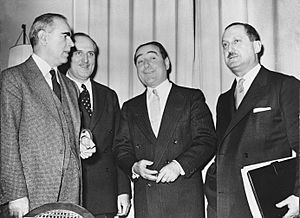London and Zürich Agreements facts for kids
The London and Zürich Agreements were important talks that helped the island of Cyprus become an independent country. These agreements began on February 19, 1959, in London. Key countries like Turkey, Greece, and the United Kingdom were involved. Leaders from the two main communities in Cyprus, Archbishop Makarios III (for Greek Cypriots) and Dr. Fazıl Küçük (for Turkish Cypriots), also took part.
Based on these talks, a special set of rules, called a constitution, was created. This constitution was agreed upon in Zürich on February 11, 1959. Two other important agreements, called the Treaties of Alliance and Guarantee, were also made at this time. Because of these agreements, Cyprus officially became an independent state on August 16, 1960.
However, things became difficult later. By 1963, the agreements faced problems. Cyprus eventually became divided into two main areas: one controlled by Greek Cypriots and another by Turkish Cypriots. The Greek Cypriot side believes the 1960 Constitution is still valid. But the Turkish Cypriot side declared its own separate state, the Turkish Republic of Northern Cyprus, in 1983.
Contents
How Cyprus Was Governed
The constitution created by the agreements set up a unique way for Cyprus to be governed. It divided the people of Cyprus into two groups based on their background.
- The President was always a Greek Cypriot. Greek Cypriots voted for their President.
- The Vice-President was always a Turkish Cypriot. Turkish Cypriots voted for their Vice-President.
The Vice-President had a very important power: they could stop laws passed by the House of Representatives. They could also stop decisions made by the Council of Ministers. The Council of Ministers had ten members. Three of these members had to be Turkish Cypriots, chosen by the Vice-President.
Laws and Decisions
In the House of Representatives, Turkish Cypriots were chosen by their own community. The House could not change the most important parts of the Constitution. Any other changes needed a special vote. Two-thirds of both the Greek Cypriot and Turkish Cypriot members had to agree.
Laws about elections, local towns, or taxes also needed special agreement. Both Greek Cypriot and Turkish Cypriot members had to agree with a simple majority. This meant that one group could not pass these important laws on their own.
What Happened Next
Dr. Galo Plaza, a United Nations mediator for Cyprus, called the 1960 Constitution "unusual." He noted that problems with putting the agreements into practice started almost right after Cyprus became independent.
Within three years, the government began to struggle. By 1963, laws about taxes expired. The House of Representatives became divided, with members voting only along their community lines. They failed to renew the income tax law, which meant the government lost a lot of money it needed.
In November 1963, the President, Archbishop Makarios III, suggested changes to the Constitution. He hoped these changes would solve the problems. However, the Turkish Cypriot leaders, supported by the Turkish government, said these changes were unacceptable. The Vice-President stated that the Republic of Cyprus had stopped working. He, along with the three Turkish Cypriot ministers and Turkish Cypriot government workers, left their positions. President Makarios did not agree to any ideas that would divide Cyprus. Talks to solve the issue have continued for many years without a full solution.
Because of these events, Cyprus has remained divided for over 50 years.
Treaties of Guarantee and Alliance
Along with the London and Zürich Agreements, two other important treaties were signed in Zürich.
Treaty of Guarantee
The Treaty of Guarantee was meant to protect Cyprus as an independent country. It also aimed to keep the two communities working together. Cyprus and the countries that guaranteed its independence (the United Kingdom, Turkey, and Greece) promised to prevent Cyprus from joining any other country. They also promised to prevent the island from being divided.
Article Four of this treaty said that if the three guaranteeing countries could not work together, each country could act alone. Their goal would be to bring back the situation created by the treaty. This meant restoring the independent state where both communities shared power.
In July 1974, there was a brief attempt by some Greek Cypriots to take control of Cyprus. Turkey then used the Treaty of Guarantee to send its military. Whether this action was fully legal depends on if the three guaranteeing countries truly could not work together. It also depends on whether the outcome of the action protected Cyprus's independence and its two communities sharing power. In 1983, Turkish Cypriots declared their own state, the Turkish Republic of Northern Cyprus. However, only Turkey recognizes this state. The United Nations has said that this declaration is not legally valid and has asked for its withdrawal. The UN Security Council has also asked all countries not to recognize this Turkish Cypriot state.
Treaty of Alliance
Greece, Turkey, and Cyprus also signed a Treaty of Alliance. This treaty created a military alliance between the three countries.
 | Claudette Colvin |
 | Myrlie Evers-Williams |
 | Alberta Odell Jones |


